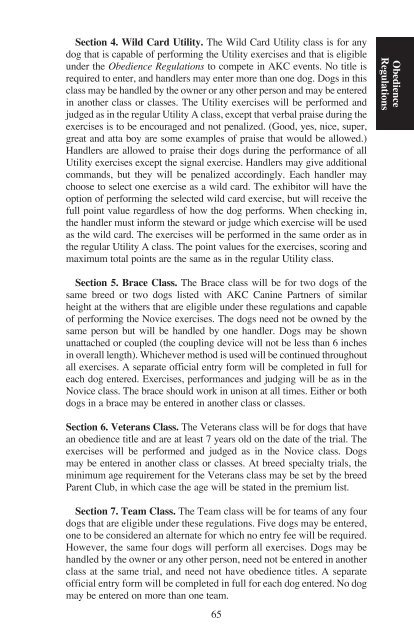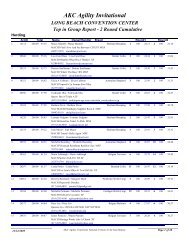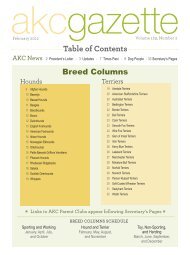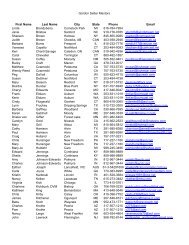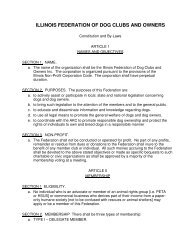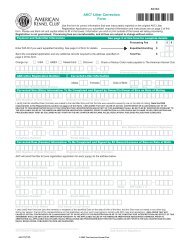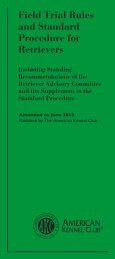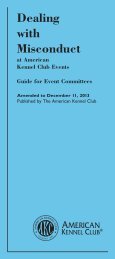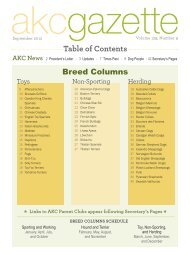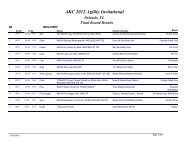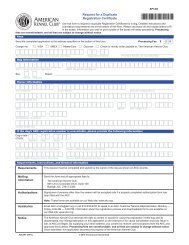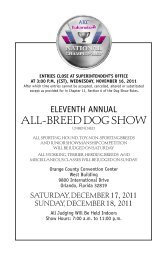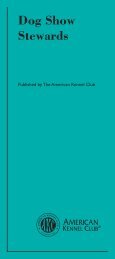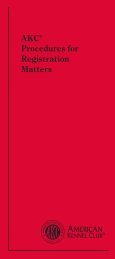Obedience Regulations - American Kennel Club
Obedience Regulations - American Kennel Club
Obedience Regulations - American Kennel Club
Create successful ePaper yourself
Turn your PDF publications into a flip-book with our unique Google optimized e-Paper software.
Section 4. Wild Card Utility. the Wild card utility class is for any<br />
dog that is capable of performing the utility exercises and that is eligible<br />
under the <strong>Obedience</strong> <strong>Regulations</strong> to compete in AKc events. no title is<br />
required to enter, and handlers may enter more than one dog. Dogs in this<br />
class may be handled by the owner or any other person and may be entered<br />
in another class or classes. the utility exercises will be performed and<br />
judged as in the regular utility A class, except that verbal praise during the<br />
exercises is to be encouraged and not penalized. (Good, yes, nice, super,<br />
great and atta boy are some examples of praise that would be allowed.)<br />
Handlers are allowed to praise their dogs during the performance of all<br />
utility exercises except the signal exercise. Handlers may give additional<br />
commands, but they will be penalized accordingly. each handler may<br />
choose to select one exercise as a wild card. the exhibitor will have the<br />
option of performing the selected wild card exercise, but will receive the<br />
full point value regardless of how the dog performs. When checking in,<br />
the handler must inform the steward or judge which exercise will be used<br />
as the wild card. the exercises will be performed in the same order as in<br />
the regular utility A class. the point values for the exercises, scoring and<br />
maximum total points are the same as in the regular utility class.<br />
Section 5. Brace Class. the brace class will be for two dogs of the<br />
same breed or two dogs listed with AKc canine Partners of similar<br />
height at the withers that are eligible under these regulations and capable<br />
of performing the novice exercises. the dogs need not be owned by the<br />
same person but will be handled by one handler. Dogs may be shown<br />
unattached or coupled (the coupling device will not be less than 6 inches<br />
in overall length). Whichever method is used will be continued throughout<br />
all exercises. A separate official entry form will be completed in full for<br />
each dog entered. exercises, performances and judging will be as in the<br />
novice class. the brace should work in unison at all times. either or both<br />
dogs in a brace may be entered in another class or classes.<br />
Section 6. Veterans Class. the Veterans class will be for dogs that have<br />
an obedience title and are at least 7 years old on the date of the trial. the<br />
exercises will be performed and judged as in the novice class. Dogs<br />
may be entered in another class or classes. At breed specialty trials, the<br />
minimum age requirement for the Veterans class may be set by the breed<br />
Parent club, in which case the age will be stated in the premium list.<br />
Section 7. Team Class. the team class will be for teams of any four<br />
dogs that are eligible under these regulations. Five dogs may be entered,<br />
one to be considered an alternate for which no entry fee will be required.<br />
However, the same four dogs will perform all exercises. Dogs may be<br />
handled by the owner or any other person, need not be entered in another<br />
class at the same trial, and need not have obedience titles. A separate<br />
official entry form will be completed in full for each dog entered. no dog<br />
may be entered on more than one team.<br />
65<br />
<strong>Obedience</strong><br />
<strong>Regulations</strong>


